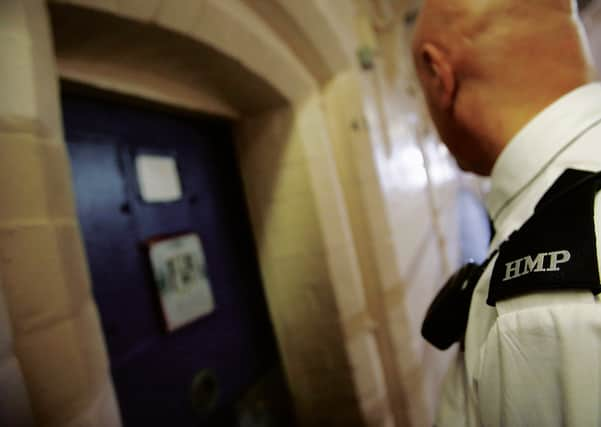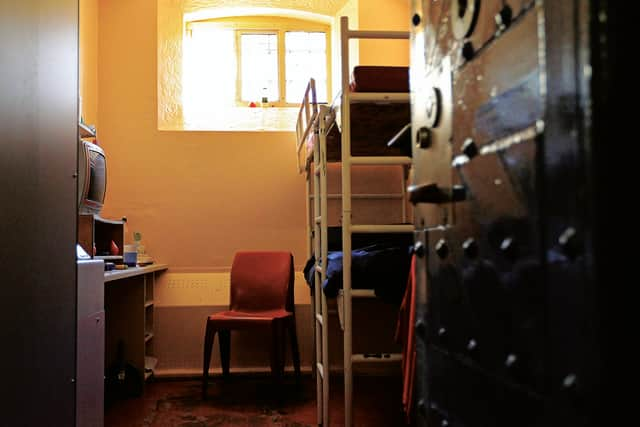Insight: ‘Perfect conditions’ for a Covid-19 prison outbreak in Scotland


Jacqueline*, a nurse, currently on maternity leave, is looking after her six-month-old daughter and worrying about her partner, Dave. “I worry about him stuck in a confined space during this pandemic,” shfe says. “I think about how time is passing and our daughter isn’t getting to know him, and I don’t understand why he can’t come home.”
Jacqueline’s partner is in Barlinnie jail. He has a respiratory condition that requires the use of two inhalers, yet shares a cell with another prisoner. Jacqueline says he is low-risk; he expected to be released on a Home Detention Curfew (HDC) earlier this month, but for some reason this has been delayed.
Advertisement
Hide AdAdvertisement
Hide Ad“He works in the garden and is still being allowed to do that, but for many all work has stopped,” she says.


“Visiting has stopped, communal dining has stopped and prisoners are spending most of the day in their cells. Dave phones once a day, but our daughter doesn’t get to see or bond with him.”
Pat’s* partner James is in Perth Prison. She says she is lucky because he is working in the canteen and finds it easier than others to gain access to the phones, but even so her contact is extremely limited.
“They have been promised mobile phones but by the time they get them, and they are programmed and distributed, we will probably be out of lockdown. James says they are telling prisoners the phones are coming just to keep them pacified.”
Pat is also worried that if her partner contracts Covid-19, she will not be told. “James gave me some lad’s phone number last week so I could contact him and let him know his dad had been taken upstairs into isolation with symptoms,” she says.


We are all under lockdown, of course. Many of us are worrying about family members we can no longer spend time with. The angst experienced by Jacqueline and Pat is hardly unique.
But how the Scottish Prison Service (SPS) and Scottish Government deal with Covid-19 is important. Confined and often overcrowded, jails provide the perfect conditions for a mass outbreak; so the risks for both prisoners and prison officers are high. It is also a test of where we are on penal policy. We like to pride ourselves on being enlightened, yet so far, our response appears to have been sluggish and confused.
As elsewhere, PPE (Personal Protective Equipment) has been in short supply, the testing of prisoners is inconsistent (it depends on local health board policy); the testing of staff only began a week ago, and, as mentioned, the promised introduction of phones in cells to make family contact easier is still weeks away.
Advertisement
Hide AdAdvertisement
Hide Ad“The Justice Secretary [Humza Yousaf] promised family contact would be increased. So far the only thing that has happened is the setting up of the family helpline,” says Emma Jardine, policy and public affairs adviser of the Howard League Scotland.
“We are way behind other countries – in Catalonia, prisoners are now getting 20 eight-minute calls a week, and if the prisoners can’t afford that the prisons are paying for it.”
Until the coronavirus struck, we had one of the highest imprisonment rates in western Europe. Many of our jails are overcrowded. Though the number of inmates has dropped by 600 to 7,400 in the last few weeks, due to a reduction in court business, many jails are still having to double (and in some cases triple) up.
A Victorian throw-back, Barlinnie was recently reported to be 140 per cent over-capacity. It is not fit for purpose and yet its replacement is unlikely to be ready until 2024/25.
“Walk along the corridors where plaster dust rains on your head, and walk around in the evening and think how, even though we see Scotland as being at the leading edge in penology, we are happy to ask staff and prisoners to work and live there,” Scotland’s chief inspector of prisons, Wendy Sinclair-Gieben, told Holyrood’s Public Audit Committee shortly before the coronavirus came to the UK.
Our jails also contain a large number of frail elderly prisoners and a disproportionate number with underlying health conditions.
On Friday came news of the first Covid-19-related death of a Scottish prisoner – a 66-year-old serial sex offender who was on a lifetime restriction order at HMP Edinburgh. He died in hospital.
“At HMP Edinburgh, there are wheelchairs and hoists and prisoners who are bedbound and who need turned – there is a really high percentage of social care that goes on, “ Jardine says.
Advertisement
Hide AdAdvertisement
Hide Ad“Together with the overcrowding, this means we have the perfect conditions for an outbreak.” The Howard League Scotland is also concerned about a lack of scrutiny and the potential erosion of human rights.
Last week, the Scottish Prison Service introduced new rules allowing governors to cut down on access to showers, recreation and purposeful activity if required. This was done without consultation with the NHS, which now provides the in-house healthcare.
At the same time, not only have prison inspections been suspended, but under emergency legislation, the Scottish Government now has up to 10 months to respond to Freedom of Information requests.
“We are finding it hard to get hold of information,” Jardine says. “We don’t know what the quarantine procedures are for those going into prison, or what shielding procedures there are for those with underlying health conditions.
“It is difficult even to get an accurate picture of infection levels – all we are being told is the number of individuals who are self-isolating, but, as prisoners are [mostly] not being tested we don’t really know what that means.”
Some early insight into prison officers’ concerns was gleaned when three wrote to the justice committee to describe their fears over working without PPE in circumstances in which social distancing was nigh-on impossible, and they might be required to physically intervene in confrontations.
With most inmates no longer working, recreation, communal dining and exercise restricted, and prisoners locked up for a far greater number of hours a day (from 4.30pm in most cases), tensions are likely to rise.
Early on in the crisis, two prison officers died and 16 inmates escaped in rioting sparked by lockdown in Italian jails. A fortnight later, two prison officers at Addiewell Jail near Livingston were injured after fighting broke out and fires were started.
Advertisement
Hide AdAdvertisement
Hide AdAs prisoners have understood the scale of the pandemic, they have become more ready to accept that the restrictions they are facing are necessary for their own safety, the safety of prison officers and the safety of their families.
And yet Jacqueline says that when part of Barlinnie’s D-Hall was closed (so it could be used for those who need to self-isolate) the dispersal of prisoners led to fighting elsewhere.
Pat has similar concerns about Perth. “Every time James phones I can hear prisoners banging on their cell doors,” she says.
So far Covid-19 infection rates in the Scottish Prison Service appear to be low.
On Friday, there were a total of 30 inmates self-isolating – down from 110 at the beginning of last week; the number of prisoners self-isolating in each prison was in single digits.
Likewise the proportion of staff off sick has gone down from 23 per cent to around 20 per cent. In the last few days, prison officers and NHS workers have been tested at the hub set up at Glasgow Airport, allowing some to return to work.
Philip Fairlie, national chairman of the Prison Officers Association Scotland, says that, after a period of uncertainty, there is now an adequate supply of PPE and clarity over which staff members should be wearing it and when. But he cautioned against complacency. “My fear is that both prisoners and staff will start to relax over social distancing , but it is almost inevitable the figures will rise,” he says.
Both the Scottish Government and the SPS have introduced new measures to try to compensate for some of the hardships the prisoners are suffering. Alongside the helpline, family members are now able to transfer money to prisoners electronically.
Advertisement
Hide AdAdvertisement
Hide AdInmates have had an extra £2.50 credit added for phone calls, but, as relatives have pointed out, access to the phones has been limited by staff shortages and the need to social distance.
What they really want is the promised handsets. In 2018, in-cell phones were introduced into 50 prisons in England and Wales; 900 locked Sim card handsets are being sent to a further 55 prisons in an attempt to maintain family contact during the pandemic.
In Scotland, where there are currently no in-cell phones, the process is proving more complicated. Here (as in England) the possession of a mobile phone in prison was outlawed in 2008 to prevent them being used to buy drugs or intimidate witnesses.
Then, in 2017, further legislation allowed for the use of new technology to detect and block illicit phone signals.
It is understood that – though the promised handsets have been bought – their use in Scottish prisons will require either fresh legislation or some kind of “legal fix”. This is before you consider the practicalities of vetting the users and the numbers to be accessed.
Still, given the backlash from Tory MSPs when SPS chief executive Colin McConnell mooted the idea of in-cell phones in 2013, it is astonishing it is happening at all.
Another irony is that Covid-19 could be the catalyst for an enduring decrease in the prison population. Reducing numbers has been Scottish Government policy for years and yet they have remained stubbornly high. Now it is crucial to bring them to a level where no prisoner has to share a cell.
This is not happening quickly enough for Howard League Scotland. Take those on remand. As of last week, there were 1,028 prisoners waiting for their cases to be heard, but, with jury trials postponed and a backlog of other court work, the length of time unconvicted individuals remain locked up will be extended.
Advertisement
Hide AdAdvertisement
Hide AdYet, defence advocate Brian McConnachie claims prosecutors are still opposing bail in cases where the defendants are low-risk, but have a substantial record of petty offences, such as shoplifting.
“There seems to be no attempt on the part of the Crown or the procurator fiscal to alleviate pressure on the prison system,” McConnachie says. This is particularly unreasonable in summary cases where the ultimate sentence cannot exceed 12 months, with the offender serving half. “Those on summary charges are not supposed to spend more than 40 days on remand, but if they come into the system now, there is no chance of a trial being fixed until September,” he adds.
“I believe bail should only be opposed where there is a serious risk. Moreover, I think we should be looking at those prisoners who are already on remand – particularly those with underlying conditions – to see how many of them could be released.”
Other countries, including Canada, the US, Germany and Iran have already released thousands, (and, in Iran’s case, tens of thousands) of prisoners to counter the pandemic.
In England – where two prison workers and ten prisoners have died of Covid-19 – just six out of 35 pregnant prisoners have been released so far. The government has said it plans to release 4,000 (or 5 per cent of the prison population), though Public Health England suggested the figure needed to contain the virus was 15,000.
In Scotland, the number needed to ensure single cell occupancy, is understood to be in the hundreds. Of course, the release of prisoners is both logistically fraught and politically charged. Not only do prisoners have to be thoroughly risk-assessed, support systems have to be in place: accommodation, access to the benefits and health system, and, often, recovery services. In addition, the SPS would have to be sure the prisoners could be trusted to abide by the lockdown rules being applied to everyone else. The release of lots of prisoners who refused to stay indoors and social distance would be problematic for police forces and a danger to public health.
One way the Scottish Government hopes to reduce the numbers in the coming weeks is to increase the number of people released on Home Detention Curfew (HDC), which involves electronic tagging and a requirement to stay at home for a 12-hour period overnight.
However, this is a sensitive issue. The HDC system, used for prisoners sentenced to less than four years, was tightened up in the wake of the murder of Craig McClelland in 2017. McClelland was killed by James Wright, who removed his HDC tag and went on the run.
Advertisement
Hide AdAdvertisement
Hide AdAmidst a massive public outcry, new restrictions were introduced; these included a presumption against releasing those who have been involved in acts of violence, and those involved in possession or use of an offensive weapon or a blade. As a result, the number of prisoners released on HDC fell by 75 per cent. Now the pendulum is set to swing again, with the numbers ramped up, regardless of the potential political kick-back.
However, the use of HDCs is unlikely to be enough. Earlier this month Holyrood passed emergency legislation that allows for the release of low-risk prisoners who are nearing the end of their sentence.
Critics argue there has been a lack of clarity around this. Initially, Yousaf seemed to be suggesting these were powers of “last resort “ to be used only if the situation became critical.
However, both Howard League Scotland and Fairlie believe the powers should be used pre-emptively to stop Covid-19 spreading, rather than reactively when things have already reached crisis point.
It is understood the Scottish Government is shifting towards this position, but that releases will have to be done on a phased basis as already under-pressure local authorities would struggle to cope with a large number of prisoners at this time.
“It is hoped that by the end of the month, enough prisoners will have been released to ensure no-one has to share a cell,” one source said,
Jacqueline hopes this means her partner will soon be reunited with the baby daughter he hasn’t seen for weeks. “We are in a state of emergency,” she says. “Dave is low-risk and has me to support him. I don’t understand why the Prison Service can’t look at people like him and realise it would be better for them to go back into their communities.”
*Some names in this article have been changed